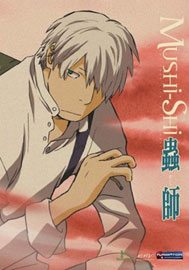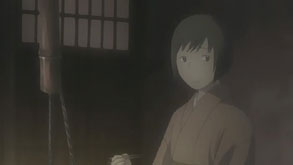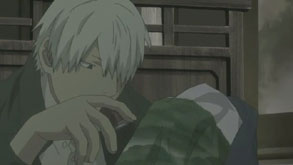|
|
Mushishi has been by far my favourite series of recent years, and its great to see that it continues to be as good as ever in this volume. Once again we join the mushishi Ginko on his travels, which
are this time even more varied than before. First he seeks shelter from a
blizzard and finds it at a house occupied by the young woman Suzu and her
younger brother Miharu. The young boy can see mushi, and Ginko agrees to
teach him to recognise them and their effects, enabling him to avoid ones that
could cause him harm. However, things aren't ever straightforward and the
boy is keeping a secret that could cause him harm in future. Ginko's
services aren't just required there though, a boatman he encounters asks if he
could help his mother, who has trouble sleeping and suffers from increasingly
severe amnesia. Ginko agrees and finds that there may be a mushi at work,
but if there is can he find a way to cure her? He also goes to visit a
friend who makes special cocoons containing mushi, these cocoons come in pairs
and a message pushed into one cocoon will be transported to the other no matter
where it is. The mushishi use these as a kind of mobile postbox, allowing
them to receive work requests and keep in touch with each other. However,
they need to be replaced every now and again and so Ginko goes to get new ones,
but there's a darker side to the mushi held within them and Ginko's friend has
suffered because of it. Can he help her get over her long-held grief?
Ginko's interest is also piqued by a coat he sees in a second-hand shop, the
coat contains a beautiful painting of a mountain range and he can detect
something about it that relates to mushi. The shopkeeper tells him the
story of the painter that created the picture and Ginko decides to try and seek
him out. |
|
If the synopsis seems a bit jumbled it's because - as with the previous three volumes - there is no ongoing story to link all the episodes together. Once again Mushishi gives us perfectly formed episode-long stories that investigates different mushi and their effects on people and communities. Each of the four episodes on this disc present a beautifully told and presented mini-film, complete with intrigue, tension, drama and even a touch of horror. The series couples each story with stunningly beautiful artwork and music that helps build an |
|
|
immersive world and injects it with a halcyon sense of times gone by. It somehow succeeds in evoking a feel of living world that it as important to the story as the characters are, in Mushishi the setting isn't simply somewhere for the story to happen - it's integral to it. Whether the mountains where Miharu finds a place of eternal spring or the hills of an artist's homeland, scenery, objects and places are more than just background, in fact they often form the basis for a story. It's the focus on the natural world that makes each story feel
like a cautionary folk tale, or old legend. A place of eternal spring, a
tree that steals your memories, a painting so good that it seems to be alive, a
young girl being taken away by mushi, each story seems like it's come from the
past, even though each one is surprisingly original. Another aspect that
gives this folk tale feel is that there is not always the happy ending you may
expect, Ginko can try but he can't always 'cure' people of their mushi
affliction. This keeps things quite fresh, as the the end of each episode
and each story is not always as you may expect. By this point - 18
episodes in by the end of this volume - it's quite rare for a series to still
surprise and draw you in as much as it did at the start, but Mushishi
manages it effortlessly. |
|
|
The stories on show in this volume are superb as always and also quite varied, in one episode the majority of the story is shown in flashback which certainly gives it a different feel too. The series has taken its time in explaining about Ginko and mushishi, but once again we learn more in this volume. It's the episode where Ginko visits Aya - the woman making the cocoons - that really stands out for me, not only do we learn about how mushishi communicate and are hired, but we also get to see a glimpse inside a mushi's world. We also |
|
get to see the effects on the loved ones of those affected by Mushi, Aya's sister Ito vanished years before into the strange tunnels travelled by the mushi in the cocoons. Aya yearns to see her again but Ginko has to try and help her understand that her sister is gone, the tunnel network is vast and even the mushishi rarely venture into it. The episode is heart-wrenchingly tragic and surprisingly emotional, particularly the epilogue, but that's not to say that the other episodes are weak. Far from it. Mushishi vol 4 contains four superb episodes that really draw you in and keep you glued to the screen throughout. If anything the effects of mushi on the people in this volume is more tragic than in some of the previous ones, but there's just something stunningly brilliant about all of them. The stories are brilliantly written and surprisingly involved considering their short running time, and somehow succeed in having plenty of variety despite featuring the same basic premise. The art, animation and music is exceptional, and although you're not going to find much here in the form of action or romance there's few better anime series available today. In my humble opinion Mushishi is the series of the year, and this volume is another ample demonstration of this. Absolutely superb. Extras: Again there's the clean opening and ending sequences and trailers, but the real bulk of the extras is made up by two lengthy creator interviews. Once again there are two interviews, both featuring the series director in discussion with one of his colleagues. This time the first one focuses on a discussion with the music director about the music used in the series, whilst the second is with the director of the opening sequence. Both interviews are surprisingly lengthy (20+ minutes each), which makes for an impressive set of extras. Ratings Feature:
|









